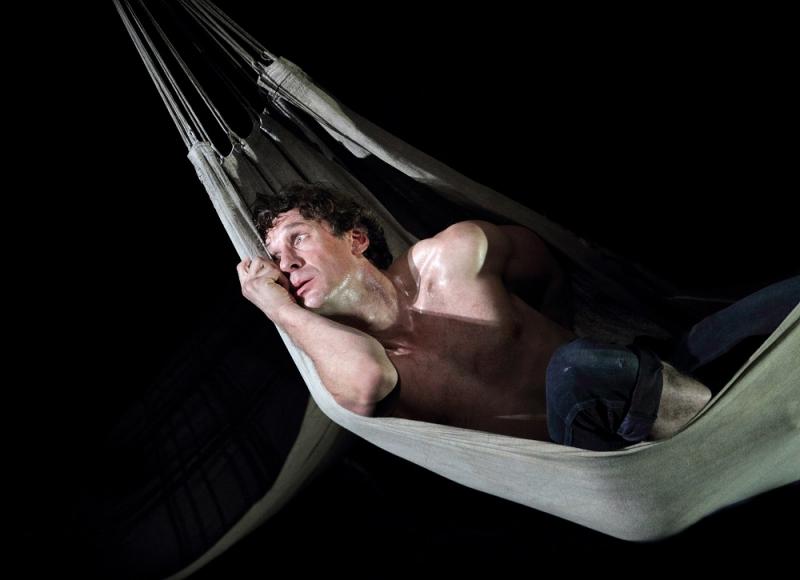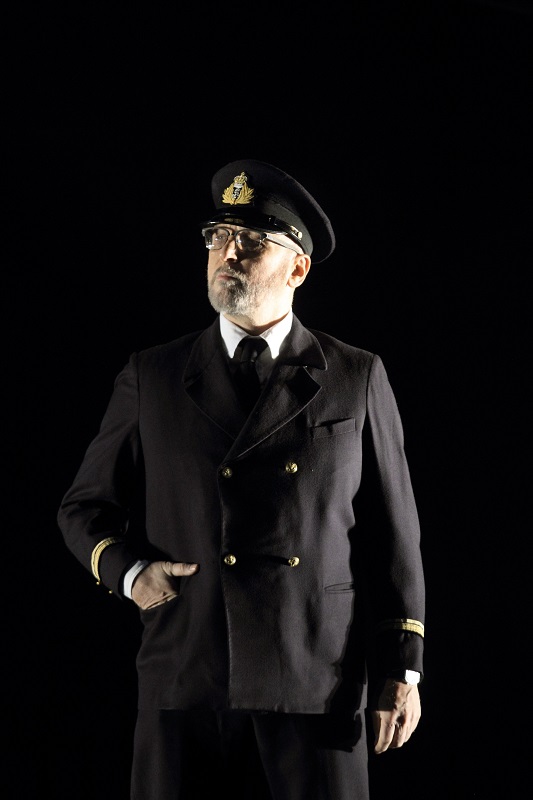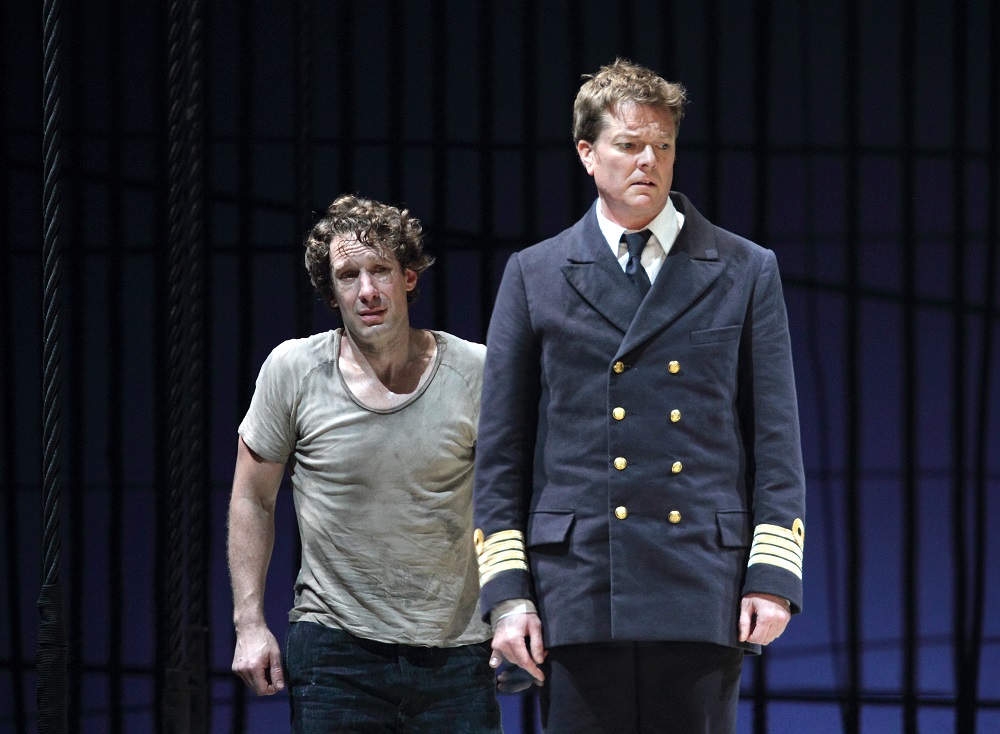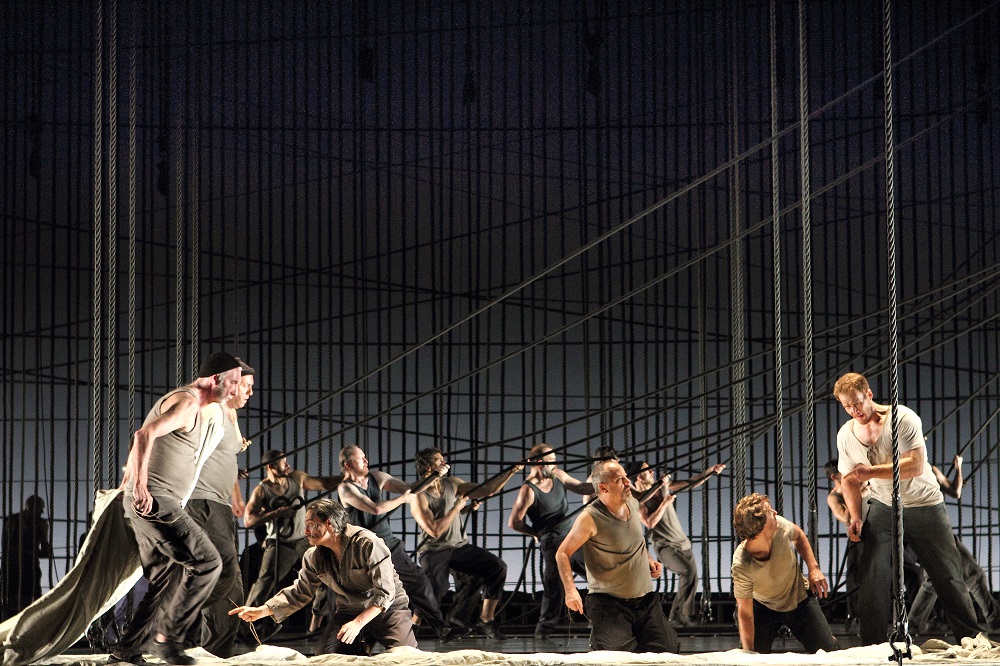Billy Budd, Royal Opera review - Britten's drama of good and evil too much at sea | reviews, news & interviews
Billy Budd, Royal Opera review - Britten's drama of good and evil too much at sea
Billy Budd, Royal Opera review - Britten's drama of good and evil too much at sea
Peerless protagonist among a crew sometimes lost on an infinite stage

On one level, it's about Biblically informed good and evil at sea, in both the literal and the metaphorical sense. On another, the love that dared not speak its name when Britten and E M Forster adapted Hermann Melville's novella is either repressed or (putatively) liberated. The conflicts can make for lacerating music theatre, as they did in Orpha Phelan's production for Opera North.
Salvation is at hand in the shape of Jacques Imbrailo's Billy, the "good boy" impressed on to the HMS Indomitable with a "flaw in the divine pattern" (a stammer, not an acceptable line of thinking now, were it not for the true flaw - what his inability to speak out leads to in the denouement). Imbrailo has come a long way since he started out at Glyndebourne in Michael Grandage's auditorium-reflecting HMS Indomitable. The range of colours and dynamics in the voice is now peerless, and Warner finds a troubled mind in this sailor which makes the characterisation more interesting.
 Unquestionably the finest scene of the evening is Claggart's monologue, where the repressed Master at Arms, unable to deal with what Forster called his "sexual discharge gone evil", lies and crouches, succubus-like, on the "deck" above the sleeping sailor in his hammock, tormenting his dreams. Brindley Sherratt's black-treacle sounds alongside the lower brass (the bass pictured right) are duly spine-tingling here. The tension holds to the end of the act; the duet between Billy and old Dansker, who tells the heedless young spark that "Jemmy Legs" (Claggart) has it in for him can be a weak curtain, but not here, given the energy of Imbrailo and Clive Bayley, whose Dansker is allowed to suggest troubled sexual attraction to his "baby" Budd.
Unquestionably the finest scene of the evening is Claggart's monologue, where the repressed Master at Arms, unable to deal with what Forster called his "sexual discharge gone evil", lies and crouches, succubus-like, on the "deck" above the sleeping sailor in his hammock, tormenting his dreams. Brindley Sherratt's black-treacle sounds alongside the lower brass (the bass pictured right) are duly spine-tingling here. The tension holds to the end of the act; the duet between Billy and old Dansker, who tells the heedless young spark that "Jemmy Legs" (Claggart) has it in for him can be a weak curtain, but not here, given the energy of Imbrailo and Clive Bayley, whose Dansker is allowed to suggest troubled sexual attraction to his "baby" Budd.
Would that more of the production brought the action to the front of the stage like this. The full width and height behind the proscenium arch, with ropes and later ladders providing the set in Michael Levine's atmospheric design, look impressive, but we need some of the characters to be further forward more of the time. Not least Toby Spence's Captain Vere (pictured below with Imbrailo), so authoritative and clarion to begin with, but in less than full, anguished voice when his clarity of vision is smashed into smithereens. Bolton could help more with pit-to-stage co-ordination here. It's odd that a conductor should come to the podium to take applause near the start after we've seen the stage set-up with Spence and the chorus, ruining what should be a chilly chamber-musical opening; team players like Mark Wigglesworth, superb interpreter of this work recently at the Norwegian Opera (free to view online at Operavision), and Edward Gardner surely wouldn't contemplate it. And Bolton fails to let out the great sails that billow through the score from time to time. There's some wonderful work from lower strings, but it's not quite enough.  Some of the possible tensions in Britten's most remarkable stretches of the score - from the mid-point of Act Two through to Billy's monologue in the "darbies" - are defused. They culminate in the great orchestral triads standing for Vere's revelatory visit to the condemned Billy (shame the hydraulic noise interferes with the last of them). Much more powerful if we don't see behind the door, as the scenario insists; so much more might have been made of the sailor laying his hand tenderly on "Starry" Vere's head here if there had been rigour around it. At the moment of crisis, Vere would never pat the doomed boy's shoulder distractedly.
Some of the possible tensions in Britten's most remarkable stretches of the score - from the mid-point of Act Two through to Billy's monologue in the "darbies" - are defused. They culminate in the great orchestral triads standing for Vere's revelatory visit to the condemned Billy (shame the hydraulic noise interferes with the last of them). Much more powerful if we don't see behind the door, as the scenario insists; so much more might have been made of the sailor laying his hand tenderly on "Starry" Vere's head here if there had been rigour around it. At the moment of crisis, Vere would never pat the doomed boy's shoulder distractedly.
The lack of distance between the officers, and between them and their men, is perplexing at times. It would be essential in any production set - as so many still are, with the reminiscing Vere at the start and end of the opera very much of the present - in the stipulated period of the action, 1797. If you're going to update, it needs to be radical, like Richard Jones's school gym for Frankfurt Opera, and some equivalent needs to be found for the fear of mutiny and the revolutionary infection spread from enemy France, excoriated in what we might now call the "Brexit duet" between Messrs Flint and Redburn (David Soar and Thomas Oliemans, both superb) in the cabin where the Captain receives them in his bathrobe. Warner gains nothing from the modern dress.  Despite the occasional difficulty in working out who's singing from where, the ensemble (pictured above with Imbrailo and Duncan Rock's Donald on the right) remains a thing of wonder, the male chorus of the Royal Opera on top form. Cameo characterisations can be lost: Alasdair Elliott's biddable Squeak should be renamed Squelch, splashing about in a channel of water midstage, and the flogged Novice (Sam Furness, strong as always) drags himself at a similar distance from stage left to right, led by his anguished friend (Dominic Sedgwick, a Jette Parker Young Artist who's already shown promise - a future Billy, perhaps). The final scenes still engross in this great masterpiece, but the pity and the terror remain at arm's length.
Despite the occasional difficulty in working out who's singing from where, the ensemble (pictured above with Imbrailo and Duncan Rock's Donald on the right) remains a thing of wonder, the male chorus of the Royal Opera on top form. Cameo characterisations can be lost: Alasdair Elliott's biddable Squeak should be renamed Squelch, splashing about in a channel of water midstage, and the flogged Novice (Sam Furness, strong as always) drags himself at a similar distance from stage left to right, led by his anguished friend (Dominic Sedgwick, a Jette Parker Young Artist who's already shown promise - a future Billy, perhaps). The final scenes still engross in this great masterpiece, but the pity and the terror remain at arm's length.
Add comment
The future of Arts Journalism
You can stop theartsdesk.com closing!
We urgently need financing to survive. Our fundraising drive has thus far raised £49,000 but we need to reach £100,000 or we will be forced to close. Please contribute here: https://gofund.me/c3f6033d
And if you can forward this information to anyone who might assist, we’d be grateful.

Subscribe to theartsdesk.com
Thank you for continuing to read our work on theartsdesk.com. For unlimited access to every article in its entirety, including our archive of more than 15,000 pieces, we're asking for £5 per month or £40 per year. We feel it's a very good deal, and hope you do too.
To take a subscription now simply click here.
And if you're looking for that extra gift for a friend or family member, why not treat them to a theartsdesk.com gift subscription?
more Opera
 Semele, Royal Opera review - unholy smoke
Style comes and goes in a justifiably dark treatment of Handelian myth
Semele, Royal Opera review - unholy smoke
Style comes and goes in a justifiably dark treatment of Handelian myth
 Le nozze di Figaro, Glyndebourne review - perceptive humanity in period setting
Mostly glorious cast, sharp ideas, fussy conducting
Le nozze di Figaro, Glyndebourne review - perceptive humanity in period setting
Mostly glorious cast, sharp ideas, fussy conducting
 Fidelio, Garsington Opera review - a battle of sunshine and shadows
Intimacy yields to spectacle as Beethoven's light of freedom triumphs
Fidelio, Garsington Opera review - a battle of sunshine and shadows
Intimacy yields to spectacle as Beethoven's light of freedom triumphs
 Dangerous Matter, RNCM, Manchester review - opera meets science in an 18th century tale
Big doses of history and didaction are injected into 50 minutes of music theatre
Dangerous Matter, RNCM, Manchester review - opera meets science in an 18th century tale
Big doses of history and didaction are injected into 50 minutes of music theatre
 Mazeppa, Grange Park Opera review - a gripping reassessment
Unbalanced drama with a powerful core, uninhibitedly staged
Mazeppa, Grange Park Opera review - a gripping reassessment
Unbalanced drama with a powerful core, uninhibitedly staged
 Saul, Glyndebourne review - playful, visually ravishing descent into darkness
Ten years after it first opened Barrie Kosky's production still packs a hefty punch
Saul, Glyndebourne review - playful, visually ravishing descent into darkness
Ten years after it first opened Barrie Kosky's production still packs a hefty punch
 Così fan tutte, Nevill Holt Festival/Opera North review - re-writing the script
Real feeling turns the tables on stage artifice in Mozart that charms, and moves
Così fan tutte, Nevill Holt Festival/Opera North review - re-writing the script
Real feeling turns the tables on stage artifice in Mozart that charms, and moves
 La Straniera, Chelsea Opera Group, Barlow, Cadogan Hall review - diva power saves minor Bellini
Australian soprano Helena Dix is honoured by fine fellow singers, but not her conductor
La Straniera, Chelsea Opera Group, Barlow, Cadogan Hall review - diva power saves minor Bellini
Australian soprano Helena Dix is honoured by fine fellow singers, but not her conductor
 The Queen of Spades, Garsington Opera review - sonorous gliding over a heart of darkness
Striking design and clear concept, but the intensity within comes and goes
The Queen of Spades, Garsington Opera review - sonorous gliding over a heart of darkness
Striking design and clear concept, but the intensity within comes and goes
 The Flying Dutchman, Opera Holland Park review - into the storm of dreams
A well-skippered Wagnerian voyage between fantasy and realism
The Flying Dutchman, Opera Holland Park review - into the storm of dreams
A well-skippered Wagnerian voyage between fantasy and realism
 Il Trittico, Opéra de Paris review - reordered Puccini works for a phenomenal singing actor
Asmik Grigorian takes all three soprano leads in a near-perfect ensemble
Il Trittico, Opéra de Paris review - reordered Puccini works for a phenomenal singing actor
Asmik Grigorian takes all three soprano leads in a near-perfect ensemble
 Faust, Royal Opera review - pure theatre in this solid revival
A Faust that smuggles its damnation under theatrical spectacle and excess
Faust, Royal Opera review - pure theatre in this solid revival
A Faust that smuggles its damnation under theatrical spectacle and excess

Comments
The crystalline nature of the